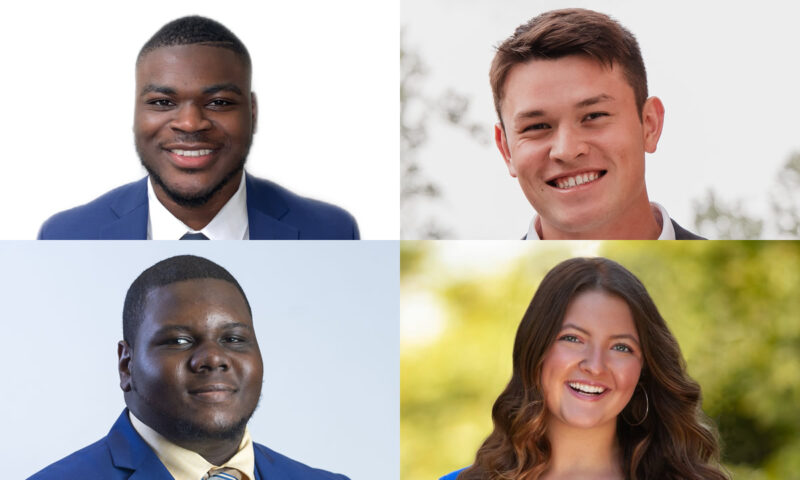As Comm School students refine their skills across many varied aspects of business, it makes sense that a good number of them choose to dedicate some of their time working with CASH—“Creating Assets, Savings & Hope,” that is.
The program was created by McIntire Class of ’09 alumna Deborah Davis (née Perl) in Madison House, UVA’s volunteer center. CASH has been helping Charlottesville residents with low to moderate incomes file their tax returns and receive much needed refunds without the fees they might otherwise have to pay at a commercial tax-preparation business for the same services.
Yahya Ahmad, Steven Jiang, Niharika Kollipara, and Jessica Wen, all in the Class of ’23, are currently volunteering with CASH for different reasons, but have each had rewarding experiences working with the organization.
Ahmad, a Finance and Marketing concentrator, says he made the decision to join early in his first year at the University upon a recommendation from then-third-year Tsega Fisseha (McIntire ’22), who was serving as a program director in CASH. Because the program provided a solid foundation in tax information, which fit his career plans, he was sold.
Though Kollipara, who is minoring in Data Analytics and intends to concentrate in IT and Marketing, was driven to apply to many clubs, she wasn’t exactly sure which ones would be a good fit. Currently also a member of Smart Woman Securities and in the process of founding an Asian Student Network at McIntire with Class of ’23 Comm students Sanjeev Kumar, Elise Nguyen, Isabelle Nguyen, and Reza Zaidi, she too joined CASH after an older peer recommended it to her.
“I used to always do volunteer work back home [in Aldie, VA], and I wanted to interact with people in Charlottesville outside of the UVA bubble,” she admits, noting that she thought it would be beneficial to learn about filing taxes.
Jiang, a Finance and IT concentrator double majoring in Archaeology, says he chose to volunteer with CASH because he was motivated by a desire to give back to Charlottesville residents.
“Coming into UVA as a first-generation low-income student, I wanted to be involved in organizations that allowed me to create an impact on the surrounding community,” says the McIntire Commerce Cohort participant who now serves as a mentor for the 2025 Cohort. “Being able to work firsthand with clients on their taxes is extremely humbling.” The time he spent fits with his goal to establish a nonprofit that helps “low-income families gain financial knowledge and independence.”
Like Jiang, Wen was on the lookout for volunteering possibilities that would allow her to directly interact with Charlottesville residents, as well as to have more exposure to the city. “I also wanted to use the opportunity to learn a new skill in an area that I thought would become useful in the future. Applying to CASH seemed like a no-brainer!” says the Marketing and Management concentrator who is double majoring in Computer Science.
A Value Add to Commerce
Kollipara explains that there are roughly 28 program directors who are tasked with leading training shifts in the fall and tax-preparation shifts in the spring. She notes that due to the sheer number of McIntire students involved in the group, a strong contingent of students within the Comm School committed to helping Charlottesville has been created.
“Oftentimes, being at UVA, we become stuck in our own bubble and don’t notice the community. CASH has allowed me to interact with Charlottesville, and try to make a positive impact for these families and individuals; it’s an extremely rewarding experience and is a lesson I look to carry forward wherever I go in the future,” Kollipara says.
Jiang has been a CASH volunteer and a program director and is currently a tax chair. Since first becoming a part of the group, he was motivated to take on more responsibilities in hopes of assisting as many people as possible.
“Even with the pandemic, we were able to shift all of our trainings and tax filings online to continue helping families,” says the Richmond, VA, native.
Jiang says the position has supported his Comm School experience by giving him additional strategies for collaborating effectively with groups, something that’s been beneficial with the teamwork of the Integrated Core.
“Being able to resolve conflicts with clients and work towards a common goal has also helped me with Integrated Core team-based assignments. In Organizational Behavior, I was able to talk about my CASH experience and learn more efficient ways to deal with conflict to enhance interpersonal communication,” he says, adding that the technical requirements of the role, such as understanding the tax code, have been of use in Accounting- and Finance-related coursework.
“The skill sets and experiences that I’ve gained in CASH have greatly extended my Comm School experience and have helped me develop as an individual and a leader.”
His fellow CASH colleague from Richmond, VA, Wen, says that participation supported her time at McIntire as well.
“Many people who volunteered in my shift in my first year were also pre-Commerce or were third- and fourth-years already in the Comm School. I got to learn a lot about McIntire and get a pretty wide diversity of perspectives. I also had the support of my pre-Commerce peers in my shift,” says Wen.
Meeting Challenges, Learning Experiences
As can be expected, some of the more difficult aspects of CASH are working with taxes.
Jiang says that keeping up with the ever-evolving tax code has proven interesting.
“Each year, new regulations emerge that we have to be aware of in order to serve our clients. It is important for all of the volunteers and program directors to understand these new initiatives,” he points out, as the students then need to explain to clients how changes can affect their annual refunds. “As the tax chair this year, it is my role to teach the 20+ program directors about these changes, who then teach it to the 100+ volunteers. With the pandemic, new tax laws are constantly being created, and I have to be able to communicate these changes to everyone in the organization.”
For Kollipara, the shifts in service delivery brought about by social distancing requirements during the pandemic were particularly difficult; that change to virtual interaction with clients coincided with her becoming a program director during her second year.
“Conducting CASH virtually was challenging because we did not have the client right in front of us and could not ask any and all questions right then and there. We also could not use Zoom because it’s not encrypted,” she explains, detailing the logistical issues involved in getting clients at a good time to talk on the phone.
“In addition to that difficult transition, being a program director for the first time, I was responsible for leading a group of 12-15 volunteers who all relied on me to lead them,” Kollipara says, as students looked to her for the best ways to deal with clients and for tax questions. “It was definitely overwhelming at first; however, it has really helped me build my ability to think on my feet and be confident in my knowledge and ability to lead a group successfully.”
Kollipara believes that successfully providing tax-preparation services during the pandemic was her most important achievement. “Our head program director told us repeatedly how thankful our clients were that we were still providing these services during this uncertain time, which made all the challenges we faced at first worth it by the end of the semester.”
Ahmad found the most impactful learning experiences to come from his shifts filing taxes.
“We would have clients come in with a complicated filing status or a certain tax form that we would then have to work together to research and find solutions with our program directors and peer volunteers,” recalls the product of Springfield, VA. He says that the interaction has also been the most engaging.
“The clients we meet with have always been my favorite part of volunteering with the organization, as you meet a wide variety of residents with interesting personalities! Filing their taxes, along with helping explain to them their returns at no cost for them, is a service I respect, and many of them are very appreciative of the help.”
Jiang points to filing nonresident alien (NRA) returns during his first year in CASH, when he learned how to file them firsthand.
“These returns are usually reserved for returning volunteers, but I took the initiative to learn more about them. Typically, the clients are international students or community members without citizenship status,” he says, defining their inherent complexities that take more time and demand an understanding of international and U.S. tax codes. “I found that being able to take on something as difficult as an NRA return has prepared me for a lot of the complicated returns that came in during my time in CASH.”
Wen says that a particularly heartfelt, early interaction stays with her today.
“One of the first clients I had was this sweet senior lady. While I was inputting her information, she was essentially telling me her entire life story. She talked about her sons who were in the military, what her favorite parts of Charlottesville were, and some really insightful life lessons that I will carry with me for the rest of my life,” she says.
“At that point, I was still a CASH newbie, so I was nervous to be interacting with clients one-on-one. But this lady made all those worries disappear,” Wen remembers, as the woman continued to express how the program had helped her over the years. “It was one of those moments that shows you just how much of an impact you can make on others with just a few hours of your time.”



